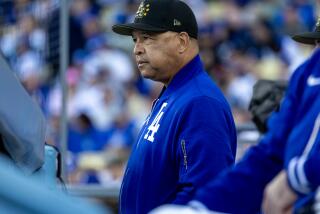If Athletes Want to Abuse Drugs, It’s Their Problem
- Share via
The Dodgers were boarding their private jet at a New York airport several years ago. The players and others in the traveling party were ushered around the metal detector, where a long line of people waited for the standard scanning for bombs and weapons.
One lady in the line was indignant.
“How come they don’t have to go through the metal detector?” she demanded of an airport security cop.
“Lady, the Dodgers have their own airplane,” the security cop explained. “If they want to blow it up, that’s their business.”
That’s the way I’m starting to look at drugs and athletes.
We should be educating and informing these athletes about what drugs do. We should do our best to cut off the supply. Throw in lots of peer pressure, counseling, testing if there’s probable cause, second chances, rehabilitation, incentives, any help we can give.
Then, after all that, if they still want to blow themselves up, that’s their business.
There’s only so far we could and should go to baby-sit these people. Should we test them every month? Every day? Follow them around in the off-season with surprise visits from roving urine-testmobiles?
Pete Rozelle has announced a plan to randomly test every NFL player at least twice during the season. The players’ union is protesting, and the union will probably prevail. Without union agreement, Rozelle’s new plan is probably unworkable.
That’s just as well, because I don’t believe random testing of every pro athlete is the right or effective way to go.
But what about Lenny Bias and Don Rogers? What about the kids who are influenced by their pro athlete heroes?
Drug testing wouldn’t have saved Bias and Rogers. Both had been tested, in season, and found clean, but each tragically overdosed in the off-season. Which only shows that drug testing, while an effective momentary deterrent, doesn’t knock out a person’s inclination to partake of drugs, doesn’t protect him from evil outside influences.
As for the impressionable youth of America, looking up to pro athletes, I’d tell them to keep looking. This is real life. The athletes you admire are not perfect. Some of them take drugs, even some real nice guys and gals. By taking drugs, some of them ruin their careers and their lives, and a few of them even die young of overdose. And all of them were sure they could handle drugs. Most started drugs as a lark, innocent fun.
But keep looking, kids. Some of your heroes, while not perfect, choose not to take drugs. Look at them, too. Check ‘em out. Whatever problems they have, they don’t wind up in gutters or rehab houses or morgues. Some of them even seem to enjoy life for more than 10-minute stretches of time.
Take your choice, kids. Do you want to grow up to be a Walter Payton, or a Don Rogers? Do you want to grow up to be a Magic Johnson, or a Micheal Ray Richardson?
We’ll help you all we can. But we can’t follow you around all your life, testing and spying, even if you’re a famous athlete. Somewhere along the line, maybe a lot of places along the line, you’re going to have to take responsibility for yourself.
I object to Rozelle’s random, blanket testing of everyone, not simply because it infringes on the players’ rights, although it does. The NFL Players Assn. will file a grievance. Had the union been around when the team owners voted to make helmets mandatory, the union would have filed a grievance.
I object to Rozelle’s plan because it’s cosmetic. Testing, as the tragedies of Bias and Rogers showed us, is only a momentary deterrent at best. Even baseball commissioner Peter Ueberroth, who comes off as a hard-core, pro-test guy, sees random testing as only a short-term measure, not the key to an anti-drug program.
Maybe the intentions of the various league commissioners are pure, but their rushing to implement strong anti-drug programs, especially the testing parts of the programs, smacks of marketing strategy, smart PR. Why don’t they crack down on steroid abuse, a dangerous and widespread practice? Because steroid abuse doesn’t discourage the paying customer.
Why can’t the commissioners of all the pro sports leagues, and all the reps of the various pro players’ unions, get together and come up with a monster drug attack plan? Because they are in competition, even to see what league can have the fewest arrests and scandals and advertise itself as the cleanest.
I asked Ueberroth why, if he’s so sure his anti-drug program will be effective, he doesn’t phone Rozelle and NBA commissioner David Stern and offer to share his plan.
“I did,” Ueberroth said. He indicated that Stern and Rozelle were not interested in meeting with him.
I like Ueberroth’s zeal in attacking the problem at the junior high school level, where the real drug action is, and at the government level, trying to control the supply. Let’s drug-test kids in junior high, in high school, even college, where they are young and impressionable and naive and need protection. By the time they are pros they should be making their own decisions.
As for Rozelle’s random testing, better he should put the league’s time and energy into the education, information and assistance of the players. Give them a chance to be clean by personal choice.
And those unfortunate few who resist all efforts of sincere guidance, who in one way or another blow themselves up, well, that’s tragic, but that’s their business.
More to Read
Go beyond the scoreboard
Get the latest on L.A.'s teams in the daily Sports Report newsletter.
You may occasionally receive promotional content from the Los Angeles Times.










